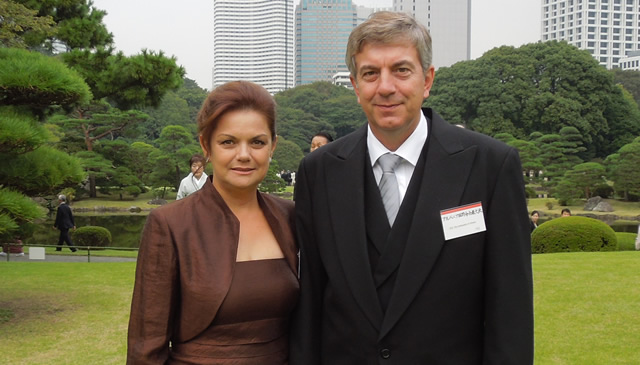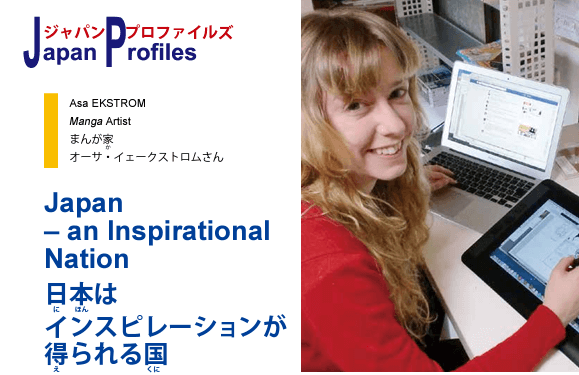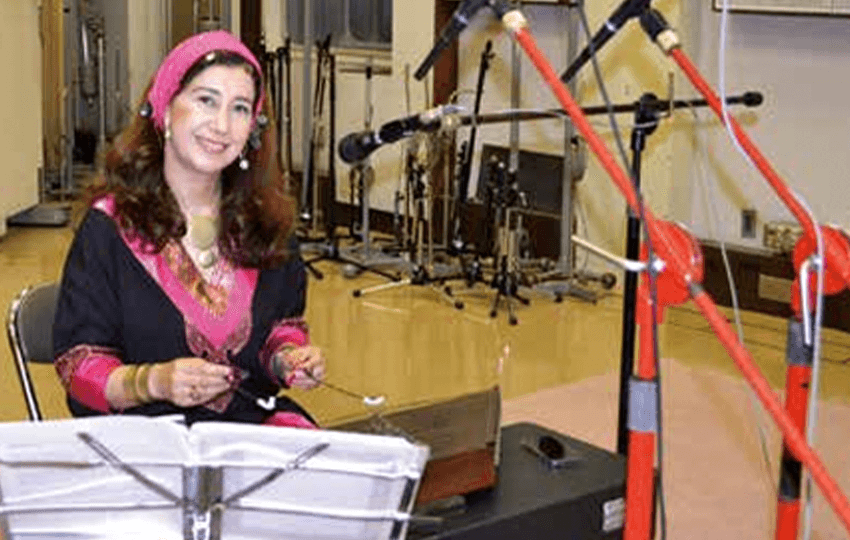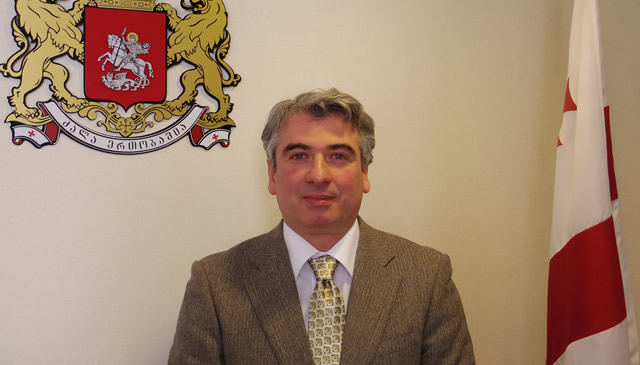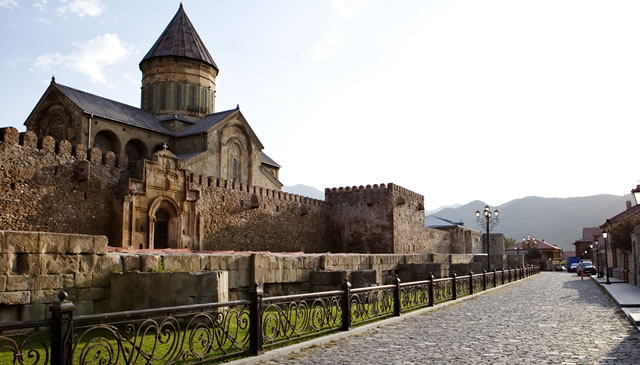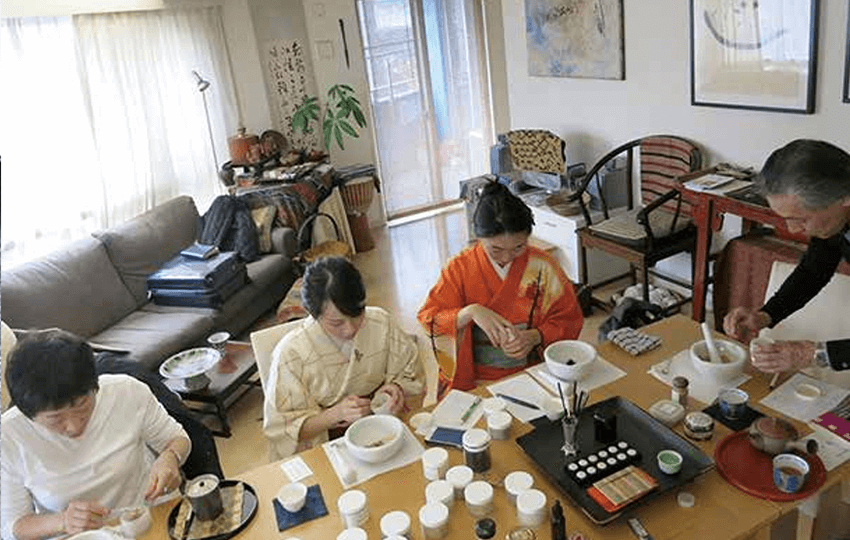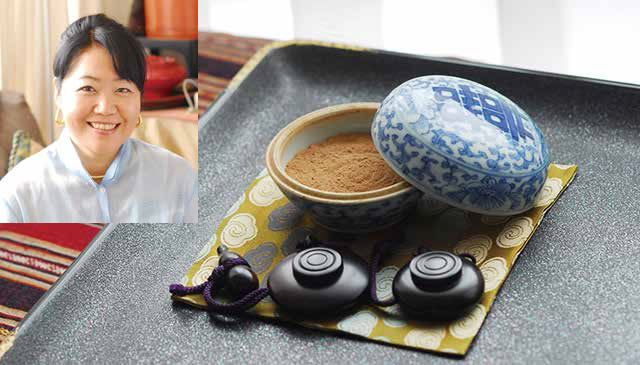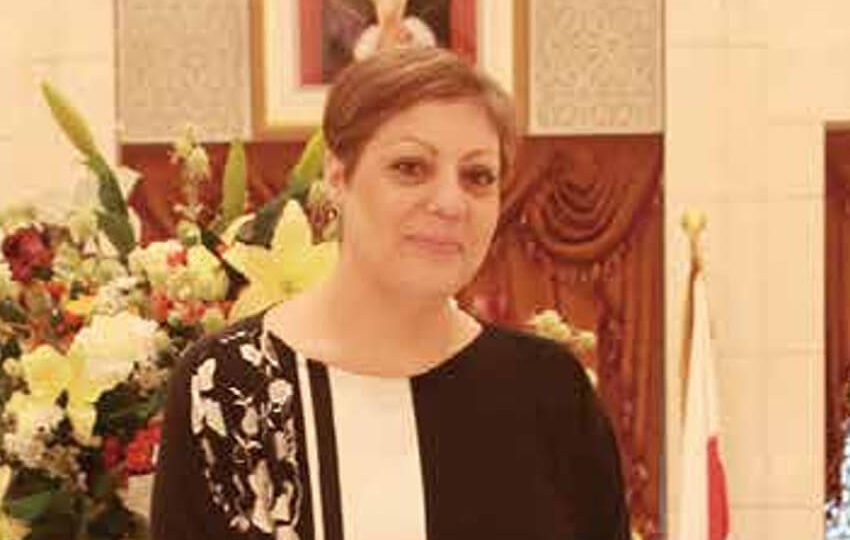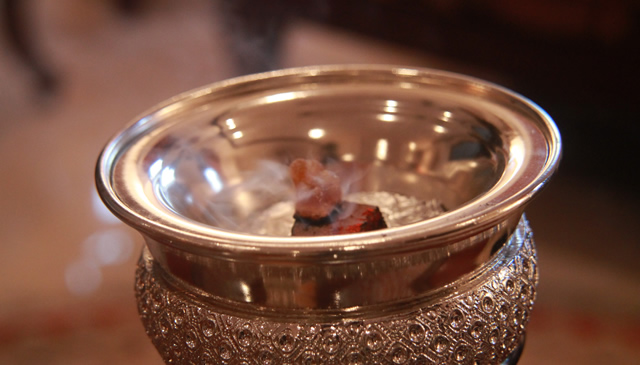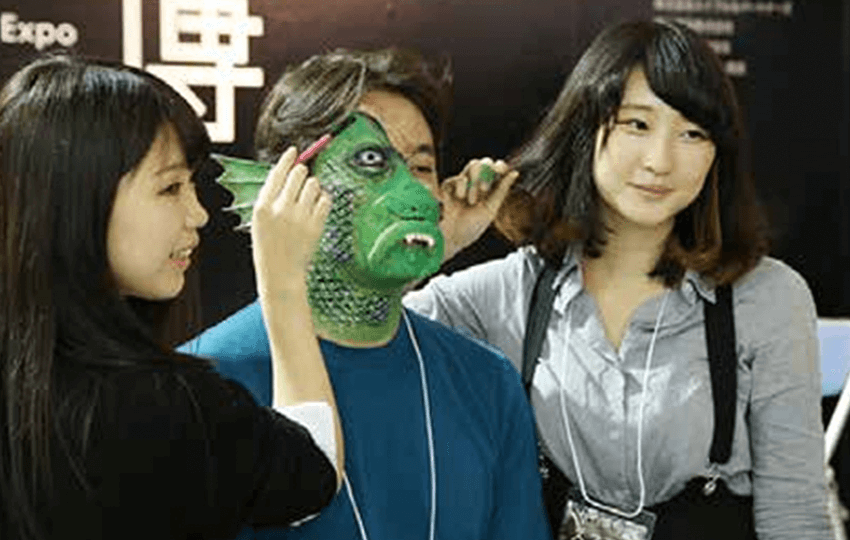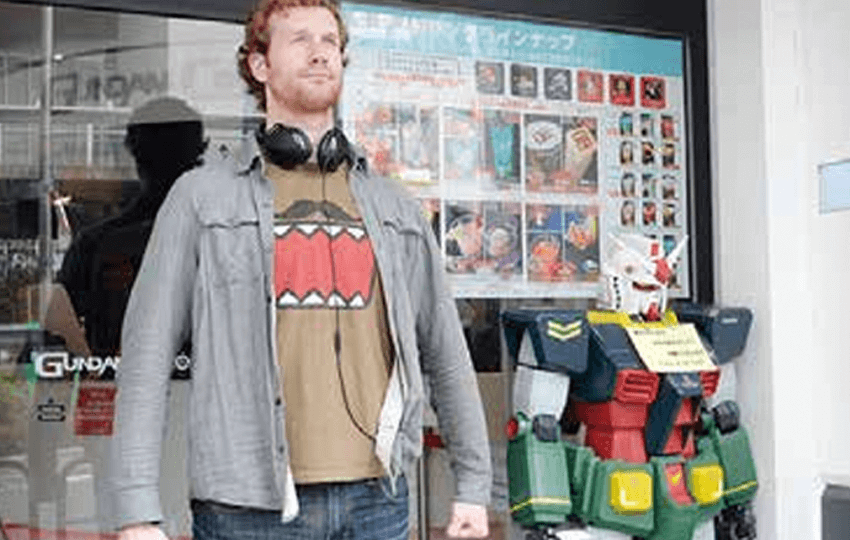-
[From August Issue 2015]
Dace PENKE
Wife of the Ambassador of the Republic of Latvia
Located in Northern Europe, the Baltic state of Latvia gained its independence from the Soviet Union in 1991. Mrs. Dace PENKE has been living in Tokyo since her husband, Mr. Normans PENKE, was stationed in Japan on September 2013 as the Ambassador of Latvia. She studied architecture at university and finds Tokyo’s combination of traditional and modern very interesting.
When she has time, she goes to exhibitions at galleries and attends craft classes and workshops. She is particularly impressed with the transportation system in Tokyo. “I can go anywhere by train, subway, and bus. It is amazing! However, the only challenge for me is the language barrier, as I’ve found that not so many Japanese speak English. Learning Japanese is not an easy task, but I try to do my best,” she says.
So many things have impressed her in Japan. For example, fresh and delicious Japanese food, sushi, and sashimi are her favorite dishes. She talked about a special experience at a traditional Japanese restaurant in Kagurazaka where she ate Japanese kaiseki.
“The attention to detail, the presentation of the food, the seasonal and local food, the food textures, the service, and so on, is amazing. I saw a geisha performance for the first time, and I really felt the hospitality of the Japanese in this traditional setting. Japanese hospitality is something we want to introduce in my country. Japan’s old traditions, like wearing kimono, tea ceremonies, traditional crafts, and its many religious ceremonies, are still alive. I hope that these traditions will be practiced for many years to come. One of the strengths of the Japanese people is the way they keep traditions alive,” she says.Speaking of Latvia, the four cornerstones of the Latvian economy are agriculture, chemical industries, logistics, and woodworking. Other prominent sectors include textiles, food processing, machine production, and green technologies. Innovations made in Latvia are highly appreciated by world markets. Recently Latvia has been focusing on design.
“The Latvian Embassy in Japan just organized the Latvian Design and art week in Minami Aoyama at the gallery Athalie, and it was very successful. Art and design traditions are very strong in Latvia; rooted in traditional craftsmanship, they also draw on contemporary global trends. Many young Latvian designers that have been studying abroad are now coming back to Latvia and expressing their creativity in amazing ways. I really want to promote such things to Japan,” says Mrs. Penke.
“The most important national festival of the year is Jani (Summer Solstice Festival). On this day, the cities empty, and every civil servant and bank clerk shows their pagan side. It started out as an ancient fertility festival celebrated after sowing the crops and before gathering the harvest. Families get together in their countryside homes. They make bouquets and wreaths out of herbs, flowers, and leaves. Women traditionally wear flower wreaths, while men have theirs made of oak leaves or twigs.”
“The livestock and fences are adorned with wreaths. Gates and rooms are decorated with birch, oak, and rowan branches. Latvians sing, dance, eat, and are merry during Jani. Cheese with caraway seeds, meat patties, and beer is a must for every table. People light bonfires and celebrate until sunrise. Romantic couples leave the crowds to look for the ‘flower of the fern,’ which is alleged to bloom only on the night of Jani,” says Mrs. Penke.
“The Latvian folk singing tradition is more than a thousand years old, and those folk songs are deeply connected with our spirit. For Latvian people singing and music is not just a form of entertainment but the core of our identity and one of the most important reasons why Latvia, a small nation, was able to preserve its language and culture for many centuries. These factors also played a major role when Latvia first gained independence in 1918 and re-gained it after the collapse of the Soviet Union in 1991.”
“These folk song texts are called dines and come in a format of four short lines. Dainas can be sung as songs or recited as short poems. About 1.2 million dines with 300,000 different melodies have been identified. Our drains have been included in UNESCO’s Memory of the World list. Being brief forms of expression, dines and haiku have something in common,” she says.
“The musical relationship between Japan and Latvia is very active. “More than ten years ago, the Latvia Japan Music Association was established by Japanese people who had visited Latvia and been impressed by Latvia and its music. One of the most interesting things is that there is a choir called Gaisma (Light), where Japanese men and women from the association sing Latvian songs in the Latvian language.”
“Ms. KATO Tokiko’s song ‘A Million Roses’ became a big hit. This song was composed by the Latvian composer Mr. Raimonds PAULS. Culture is the bridge between nations that reflect that we all share the same core human values. At a basic level, we are all the same, with the same aspirations for peace, freedom, and happiness,” says Mrs. Penke.
The people in Latvia appreciate nature. “I recommend that the Japanese visit my beautiful country. A must-see is the capital city of Riga which has more than 400 Art Nouveau buildings. It has been named one of the most attractive tourism destinations in the world by leading newspapers. The wonderful old town – old Riga – is 800 years old and is on the UNESCO heritage list.”
“The seaside town, Jurmala, with more than 500 kilometers of pristine white sand beach, is beautiful. If you want to see an old castle, Sigulda has great views of a river and valley. I also recommend Cesis, an 800-year-old castle town.”
“It takes about 14 hours from Tokyo to Riga via Helsinki. In Latvia a lot of information is available online and printed material is available for tourists. Every city has a tourist information bureau with maps and clear explanations, mostly in English. There are several companies specializing in attracting tourists to Latvia from Japan. So please come to Latvia,” she says.
Embassy of the Republic of Latvia in Japan[2015年8月号掲載記事]駐日ラトビア共和国大使夫人
ダッツェ・ペンケさん
ラトビアはヨーロッパの北部に位置するバルト三国の一つで、1991年にソ連から独立を勝ち取りました。ダッツェ・ペンケ大使夫人は、夫のノルマンス・ペンケ・ラトビア大使が日本に赴任した2013年9月以来共に滞在しています。夫人は大学で建築を学んだので、東京の伝統と近代の組み合わせにとても興味を持っています。
時間があるときにはギャラリーへ行ったり、工芸教室やワークショップに参加したりします。東京の交通システムには特に感銘を受けています。「電車、地下鉄、バスでどこへでも行くことができるのは驚きです! でも、英語を話せる日本人はそう多くないので、言葉の壁を乗り越えるのが大変です。日本語を学ぶのは容易ではありませんが、ベストをつくしています」と夫人は言います。
夫人を感動させたものはたくさんあります。たとえば新鮮でおいしい日本料理。すしや刺身は大好きです。神楽坂の料亭で食べた懐石料理の特別な体験についてこう話します。
「繊細な盛り付け、季節感あふれる地の食材、サービスなど、本当にすばらしいです。芸者の踊りも初めて見ました。この伝統的な場で日本のおもてなしを心から感じました。日本のおもてなしは私の国にも導入したいものです。着物、茶の湯、伝統工芸、宗教行事など日本の伝統は今も息づいています。このような伝統は将来も続いてほしいと思います。日本人の強さの一つは伝統を守っていることです」と、夫人は言います。ラトビアといえば、経済の四つの柱は農業、化学産業、流通、木工です。他の分野では、織物、食品加工、機械生産、グリーンテクノロジーがあります。ラトビアの技術革新は世界市場では高く評価されています。最近ではデザインに力を注いでいます。
「ラトビア大使館はラトビアアート・デザインウィークを南青山のギャラリー、アタリーで開催し、大好評でした。ラトビアのアートとデザインの伝統は強く残っています。伝統的な職人技に根付き、現代のグローバルトレンドにも影響を与えています。外国で学んでいる多くの若者が今ラトビアに戻ってきて、すばらしい想像力を発揮しています。それらを日本でもプロモートしたいと思います」とペンケ夫人。
「一年を通じて最も大切なお祭りはヤーニ(夏至祭)です。この日は街が空っぽになり、公務員や銀行員は普段とは異なる一面を見せます。これは、穀物の種まきをした後や収穫する前に行われる古代の盛大な祭から始まりました。家族は田舎の家に集まります。ハーブや花、葉っぱなどでブーケやリースを作ります。女性は伝統的にリースを、男性は樫の葉や小枝で作った冠を身に付けます」。
「家畜や垣根も花輪で飾ります。門や部屋は樺の木や樫、ナナカマドの枝で飾ります。ヤーニの期間中、ラトビア人は歌ったり、踊ったり、食べたりして楽しい時を過ごします。キャラウェイの種入りチーズやミートパティー、ビールは欠かせません。たき火をしたりして一晩中過ごします。恋人たちは人々から離れ、ヤーニの夜にしか咲かないといわれるシダの花を探します」とペンケ夫人。「ラトビア人が民謡を歌う伝統は、千年以上前から続いていますが、ラトビア人の精神と深くつながっています。ラトビア人にとって歌うことは単なる楽しみではなく私たちのアイデンティティーの核であり、ラトビアのような小さな国が何世紀もの間自国の言語や文化を守ることができたのは歌や音楽のおかげといっても過言ではありません。これが1918年にラトビアが初めて独立を勝ち取り、1991年のソ連崩壊後、再び独立を回復するための最も大きな力となりました」。
「民謡のテキストはダイナスと呼ばれ、短く4行でできています。ダイナスは、歌われたり、短い詩として朗読されたりします。120万のダイナスに30万の異なった曲が確認されています。ダイナスはユネスコの世界無形文化遺産に登録されています。簡略した表現法をするダイナスと俳句は共通点があります」。
「日本とラトビアの音楽でのつながりはとても強いです。10年以上前にラトビアを訪れ、国や音楽に魅了された日本の人々によって日本ラトビア音楽協会が設立されました。最も興味深いことの一つはガイスマ(光)と呼ばれるコーラスグループで、協会の日本人男性と女性がラトビア語でラトビアの歌を歌うことです」。
「加藤登紀子さんの歌『百万本のバラ』は大ヒットました。この歌はラトビアの作曲家、ライモンズ・パウルスが作りました。文化は国を結ぶかけ橋であり、人間が同じ価値を分かち合うことを証明するものです。基本的には私たちは同じで、平和や自由、幸福を同じように熱望しています」とペンケ夫人は言います。ラトビアの国民は自然を大切にしています。「日本の方に美しい私の国へ来てほしいですね。400以上のアールヌーボーの建築物がある首都のリガは見逃せません。一流紙でも世界の最も魅力的な観光地の一つとして名前をあげています。リガの旧市街は800年の歴史があり、ユネスコの世界文化遺産に登録されています」。
「海に面した街ユールマラには、500キロ以上続く手つかずの美しい白浜が昔からあります。古城を見たい人にはスィグルダがお勧めです。そこからは大河や谷を見渡せます。800年の歴史を持つ城下町のツェーシスもおすすめです」。
「東京からリガまではヘルシンキ経由で約14時間です。ラトビアでは観光客のための様々な情報がオンラインで得られ、パンフレットも用意されています。どの都市にも地図や詳しい説明(ほとんどは英語)をしてくれる観光案内所があります。日本からはラトビア観光を専門とする旅行会社もありますので、ぜひラトビアにいらしてください」。
駐日ラトビア共和国大使館 -
[From August Issue 2015]
YOKOYAMA Adina
Last summer Romanian-born YOKOYAMA Adina changed her job description from “Eastern European Cuisine researcher” to “Genuine Cuisine Researcher.” This was because she had broadened her role from teaching Eastern European cuisine to introducing people to all kinds of recipes that use no additives or refined ingredients.
Adina got married in 2005 after coming to Japan to work as a model in 1994. Together with her husband Daiki, she ran an importing business based in Chiba City. Being very busy with work, Adina struggled with constant skin problems. In addition, Daiki suffered from eczema and their oldest son struggled with childhood obesity and eczema.
In search of a simpler lifestyle, Adina and Daiki decided to move to Higashikawa Town in Hokkaido in 2006. Up until then the whole family had mostly eaten food at restaurants or meals bought at convenience stores, but their options were limited in Higashikawa Town. Adina, who had not so much as picked up a kitchen knife before, had no choice but to begin cooking for the family. It was then that memories of her beloved grandmother Anna’s cooking came back to her.
As Romania was part of the Soviet bloc until 1989, the country had not been much influenced by Western culture. Without using any artificial flavorings, her grandmother Anna, like many others, prepared simple home-cooked meals using only natural ingredients that had been around since ancient times. By cooking these family recipes, Adina realized that the health of her family was improving. Going without makeup, Adina also saw an improvement in her skin.
Adina, who learned the importance of food through personal experience, began to teach herself about nutrition and how to prepare dishes from other countries. Eventually, while teaching Romanian cuisine to others, she began to introduce recipes that didn’t include additives or refined ingredients. Her students were mostly veteran homemakers with advanced cooking skills, who showed interest in the idea of cooking meals only with natural ingredients. In 2013 she published a recipe book.
A decision was made to refer to natural ingredients and unprocessed food as “genuine,” and Adina changed her title accordingly. Last year Adina and her husband began sponsoring an event called “Genuine Hokkaido Village” that promoted the merits of a simple lifestyle. The event attracted 14 like-minded organizations, including a group of high school students, and by focusing on the benefits of food covered a wide range of themes including health, the environment, and even beauty.
Adina’s homemade pastries are available by mail order. The name of her mail order store is MamaMare, which means “Grandma” in Romanian. The goal is to make healthy food using simple ingredients that would’ve been found in Grandma Anna’s kitchen. She hopes that people will consider making their diet healthier, even if it’s only a little.
Home Made Mail Order Cafe MamaMare
Text: ICHIMURA Masayo[2015年8月号掲載記事]横山アディナさん
ルーマニア出身の横山アディナさんは、昨年の夏、自身の肩書きを東欧料理研究家から「ほんもの料理研究家」に変更しました。東欧料理を教える立場から、添加物や精製したものを使わないレシピの紹介に活動が広がったためです。
アディナさんは1994年にモデルとして来日し、その後2005年に結婚。夫のダイキさんと千葉市で輸入業を営んでいました。しかし仕事が忙しくアディナさんは常に肌荒れに悩んでいました。ダイキさんはアトピーの症状があり、長男も小児肥満とアトピーに悩んでいました。
アディナさんとダイキさんはもっとシンプルに暮らそうと2006年に北海道東川町への移住を決めます。それまで一家の食事は外食かコンビニなどで買った惣菜でしたが、東川町では飲食店の数が限られます。それまで包丁を握ったこともなかったアディナさんも必要にせまられて料理をするようになりました。そのときに思い出したのが、大好きだった祖母アンナさんが作ってくれた料理です。
ルーマニアは1989年まで共産圏で西側の文化はほとんど入ってきていませんでした。家庭での料理も化学調味料は使わず、アンナおばあさんをはじめ多くの人が昔からある天然のものだけでシンプルに仕上げていました。そのレシピで料理を作るうちに、アディナさんは家族の体調がよくなっているのに気がつきます。アディナさんもほとんどノーメイクで過ごすほど肌の調子が良くなりました。
経験から食事の大切さを実感したアディナさんは独学で栄養や各国の料理を勉強し始めました。そして、ルーマニア料理を教えつつ、添加物や精製したものを含まないレシピを提案するようになります。集まったのはアディナさんよりも料理の技術が上のベテラン主婦ばかりでしたが、天然のものだけで料理を作るという発想に興味を示しました。2013年にはレシピ本を出版します。
2人は素材そのもの、加工していないものを「ほんもの」と呼ぶことにし、アディナさんの肩書きを変更。昨年からシンプルな暮らしを提案する「北海道ほんものヴィレッジ」を主催しています。扱うテーマは食を中心に健康や環境から美容まで幅広く、2人の考えに賛同する、高校生を含め14の団体が参加しました。
アディナさんの作るスイーツは通信販売でも購入することができます。店名はMamaMare。ルーマニア語で「おばあさん」の意味です。目指すのはアンナおばあさんのキッチンにあったシンプルな材料で作る体にやさしい食べ物。少しでも体にいい食生活を考えてほしいという願いを込めています。
ホームメイド通販カフェ MamaMare
文:市村雅代 -
[:ja][2015年7月号掲載記事]
アルバニア共和国在日大使夫人
レコ・ディダさん
日本に住んで今年で5年目です。以前にも来日したことがありますので、生活には何の問題もありません。日常生活や文化、食べ物、交通、さらには言葉や自分の仕事まで日本のすべてを楽しんでいます。日本に来ると、すべての外国人が文化の違いにまず戸惑います。異文化を理解する近道は文化行事に参加して、それらの違いに慣れることです。
日本はハイテクと伝統の国です。伝統以外で、日常生活のいたるところで気づかされるのは、清潔さときちんとしていることです。着物や日本の伝統料理の優雅さ、様式にも感動しました。建物に関しても同じことが言えます。日本は世界の地震多発地帯の一つですが、日本人はすばらしい高層ビルを建てる方法を見出しました。
私が来日した頃は、七夕と盆踊りの時期でした。すぐに魅せられ、日本の伝統についてもっと知りたいと思い、日本語を通じて学ぶ決意をしました。
私は青森の「みこし祭」「ねぶた祭」や京都の「狐の嫁入り」などを通して、日本人社会が持つバイタリティーと地域の絆、また日本人の歴史観や古代からの伝統について学びました。狐の嫁入りのとき感じた神道的な気持ちが今も私の心に残っています。
日本での最悪の経験は2011年3月11日に起きた東日本大震災です。小さなコミュニティーの大使館ですが、仙台(宮城県)の友人をはじめ他の被災地の人々を支援するために留まる必要がありました。そのため、私の課題だった本を出版する決意をしました。それは、私が10年間かけて2012年の始めに完成させた、アルバニア初の日本語-アルバニア語辞書です。初めて日本へ来たときは仙台に住んでいました。日本について私が最も感動したことは、日本人の親切な心とおもてなしの心でした。日本に住みなれてさらに日本の素晴らしさに気がつきました。私はそれが、日本人が熱心に働くことと国を愛する気持ちからきていることを知りました。日本人が働くときに見せる勤勉さと時間厳守なところは、私の国にも取り入れたいですね。
アルバニアの魅力の一つは、昔のままの自然です。国土の70%は山でおおわれています。アドリア海とイオニア海に面した海岸線や、北部に位置する美しいアルプス、豊かな森や川、草原などのバラエティーに富んだ景観があります。
アルバニアの観光名所ベスト3への訪問を勧めます。これらの都市はユネスコ世界遺産になっています。ジロカストラは「石の街」としても知られ、べラティは「千の窓の街」として知られています。これらの都市には今でも人々が住んでいます。3つめは、ブトリントの遺跡です。ローマ帝国時代に栄えていた都市です。
食べ物に関しては、海岸地方で出される塩とレモンソースで味付けされた焼魚や、内陸の子羊の唐揚げがお勧めです。どの料理もアルバニアのオリーブ、オリーブオイル、白チーズが付いてきます。強いお酒が好きな方には、ブドウからつくられたアルバニア独自の伝統的な「ラク」があります。ジロカストラアルバニアの観光ポリシーは、アルバニア流のおもてなしです。毎年5千人の日本人観光客が来ますが、アルバニアと日本の旅行会社との協力でこれからはもっと増えていくでしょう。日本人はビサなしで入国できます。バルカン半島観光のピーク時には「Balkan Schengen」が適用されます。この協定によって日本からだけでなく世界のどの国の観光客も国内を自由に移動できます。
アルバニアと日本の外交関係は第一次世界大戦前までさかのぼります。アルバニアがオスマン帝国から独立を宣言し、日本は1922年に独立を承認してくれました。不幸なことにその後は関係が進展しませんでした。1987年に外交が復活し、2005年11月のアルバニア大使館開設とともに関係は深まりました。現在アルバニアと日本は、JICA(国際協力機構)との技術協力や国際機関での相互協力を通じて緊密な相互関係を築いています。
アルバニアと日本には共通点がたくさんあります。たとえば、同じような地帯と気候ですので、私にとっては自分の国にいるようです。人々の性格ではアルバニア人には「besa」(約束を守る)、日本には「武士道」という精神的な柱があります。
もちろん違いはあります。日常生活で私たちは米ではなくパンを食べます。生の魚は日本のすしや刺身と異なり、レモン、塩、オリーブオイルをつけたカルパッチョスタイルで食べます。イエス、ノーのときのうなずき方が、日本とは全く反対なので、よく間違えます。イオニア海日本の日常生活の写真を撮るのが好きです。ですからいつもカメラを持ち歩き、毎日出会う興味深い一瞬を見逃さず撮ります。富士山を訪れ、さまざまな角度から写真を撮るのが何より好きです。また、自転車で東京を探索するのも好きです。
日本の最大の宝は、国民です。すなわち文化をつくり、それを継承してきた人達です。国に繁栄をもたらす国民をいたわることが大切です。これは日本人だけでなく、世界のどの国の人にもいえることです。
アルバニア共和国大使館
文:片野順子[:en][From July Issue 2015]Wife of Albanian Ambassador to Japan
Reko DIDA
This is the fifth year I’ve been residing in Japan. I have experience living in Japan as I’ve just stated, that is why I do not have any particular difficulties living in Japan. I am enjoying every single aspect of Japan: everyday life, culture, food, transportation, even the language, and my work here in Japan. I think that all foreigners have initial difficulties when they come to Japan because of the cultural differences; participation in cultural events is the best approach for speeding up understanding and for getting used to these differences.
Japan is a country of advanced technology and of tradition. Besides tradition, cleanliness and tidiness are noticeable in every aspect of everyday life. I was also impressed by the elegance and style of kimono and traditional Japanese food. The same thing can also be seen in buildings, as Japan is one of the seismic hotspots of the world: Japanese people have learned to defy nature itself with their wonderful skyscrapers.
When I came to Japan it was the season for the Tanabata and Bon Odori festivals. These events immediately attracted me and I decided to find out more about Japanese heritage and did that through learning the Japanese language.
And through those events like “Mikoshi Matsuri,” “Nebuta Matsuri” in Aomori, or ”Kitsune no Yomeiri” in Kyoto, one learns a lot about the vitality and sense of community in Japanese society, as well as about Japanese perceptions of history and about the traditions of ancient Japan. I still have an affinity for the “shinto” feeling that came over me when I participated at the Kitsune no Yomeiri.
The worst experience I had here was on March 11, 2011, when the great earthquake happened in Eastern Japan. We are a small embassy and community here, but we felt we needed to stay to support our friends in Sendai (Miyagi Prefecture) and wherever else this natural disaster affected people. Therefore, I decided to publish my work. This was the first Japanese-Albanian dictionary, which took me ten years to make and was made available at the start of 2012.At the Nebuta FestivalWhen I first came to Japan I used to live in Sendai; one of the first things that impressed me about Japan was the kindness and hospitality of the Japanese people. As I started to adapt to Japanese life, I was able to notice more about the wonders of Japan. And I realized that it was all due to the hard work and dedication the Japanese people put into their homeland.The things that I would like my country to adopt is the diligence and punctuality that Japanese people display in their work.
One of the charms of Albania is its unspoiled nature. Seventy percent of the land is mountainous. Albania has a variety of natural landscapes such as the coast alongside the Adriatic and Ionian seas, beautiful Alps located in northern Albania, rich forests, natural rivers and fields.
I would like to recommend three of Albania’s best sightseeing spots. These are cities registered by UNESCO as World Heritage sites. We have the cities of Gjirokastra – also known as “the city of stone” – and Berat, which is known as the “city of a thousand windows.” These cities are still inhabited. The third one is the ruins of Butrinti. Butrinti was an ancient city that prospered in the Roman era.
As for food, I would like to mention the grilled fish with salt and lemon sauce that is served in our coastal areas and the fried lamb of our inland areas. All the food is served with Albanian olives, olive oil, and white cheese. For those that like strong drink, Albania has its own traditional beverage called “raki” which is made from grapes.GjirokastraOur policy is to facilitate tourism through Albanian hospitality. We have about 5,000 Japanese tourists per year, a number that is likely to increase because of the successful cooperation between Albanian and Japanese tour operators. Japanese tourists can enter Albania without a visa. During the peak season in the Balkan Peninsula, the “Balkan Schengen” applies; this facilitates the free movement of tourists not only from Japan, but also from other part of the world.
Diplomatic relations between Albania and Japan date back to before the First World War. Albania declared its independence from the Ottoman Empire and Japan acknowledged its independence in 1922. Unfortunately the relationship was not developed further. Relations were restarted in 1987 and developed further when Albania became a democratic country and solidified its relationship with the opening of the Albanian Embassy in Japan in November 2005. Today Albania and Japan have intensive bilateral relations, through technical cooperation with the JICA (Japan International Cooperation Agency), by supporting each other in international organizations.
I see a lot of parallels between Albania and Japan. For example, we share the same geographical latitude, and the climate here for me is the same as home. In terms of character, Albanians have the institution of “besa” (keeping a promise) and Japanese have the institution of “bushido” (a code of honor developed by samurai).
Of course we are different as well. We generally use bread instead of rice in our daily lives. We eat raw fish carpaccio style (sliced with lemon, salt and olive oil), which is different from “sushi and sashimi.” When we nod our heads it means the opposite to what it does in Japan, so many times people mistake a yes for a no.Ionian SeaI like spending my free time photographing aspects of everyday life in Japan. That is why I always keep a camera with me so I can photograph every interesting moment that I come across every day. More than anything I like visiting Mount Fuji and taking pictures of each side of it. I also like exploring Tokyo by bicycle.
One of Japan’s greatest treasures is its people, it is they who build and maintain the culture of their country. I think that it is important to take care of your own people as they are the ones who bring prosperity to your land. This is something that not only Japanese people should do, but also people in the rest of the world.
Embassy of the Republic of Albania in Japan
Text: KATANO Junko[:] -
[:ja]
[2015年7月号掲載記事]
まんが家
オーサ・イェークストロムさん「まんが家にとって日本はインスピレーションが得られる国です」とスウェーデン人のオーサ・イェークストロムさんは言います。オーサさんは日本での生活を4コマまんがに描いてブログで発信しました。ブログは人気が出て本になりました。続編の出版も決まっています。
オーサさんは13歳のときスウェーデンで日本のアニメ番組「美少女戦士セーラームーン」を見てファンになりました。「女性がヒロインで、かっこよく戦うところにひかれました。主人公が精神的に成長していく点も、深みがあっていいと思いました」と言います。日本のまんが「ベルサイユのばら」もフランス語版を入手して辞書を引きながら読みました。
オーサさんはまんが家を志して勉強を始め、2007年に来日して9ヵ月滞在しました。「日本語学校に通ったのですが、日本語を話せるようにはなりませんでした。完璧に話さなくてはいけないと思って黙りがちになってしまったのがよくなかったと思います」と苦笑します。
オーサさんはスウェーデンで「さよならセプテンバー」というストーリーまんがを描いてまんが家デビューしました。イケアの商品に使われる布のイラストを描くなど、イラストレーターとしても活動しました。しかしやはり日本に住みたいと思い、2011年3月10日に再び来日しました。
翌日、東日本大震災が起こりました。「原発事故のことをスウェーデンのメディアは、日本はもう終りだなどと報道していました。でも日本人の友達が訳してくれた日本の新聞では、それほど重大ではないと報じていました。どの情報が正しいのかわかりませんでした。とても不安で、一度帰国しました」。
オーサさんは10月にまた戻り、それからずっと日本で暮らしています。「日本にはできればずっと住みたいです。ビザさえ取れれば。でもビザのことは話したくないです。まんが家としてビザをとるのはとても大変ですから」と首をすくめます。二度目の滞在では、シェアハウスに住みながらグラフィックデザインの専門学校に通いました。リクルートスーツを着て、就職活動も経験しました。
今は日本語でコミュニケーションがとれます。「ブログでまんがを発表するようになってからは、読者が寄せてくれるコメントを読むことで単語を覚えました。フォーマルな場では、文末にとりあえず『です』をつけます」と笑います。
「今は自分の日常を4コマまんがに描くのが楽しいので、続けていきたいです。外国人の私だから描けるテーマでもありますし。またストーリーまんがも描きたいですね」とオーサさん。「サイン会で読者の皆さんに会えるのが楽しみです」とほほえみます。
文:砂崎良
[:en][From July Issue 2015]
Asa EKSTROM
Manga Artist
“Japan is an inspirational country for manga artists,” says Swedish-born Asa EKSTROM. Asa depicts her experience of living in Japan in four panel comic strips she posts on her blog. The blog became so popular that these short comic strips were compiled into a book. There is even a sequel in the works.
Asa became a fan of Japanese anime at the age of 13 after watching the anime series “Pretty Guardian Sailor Moon” at home in Sweden. “I was fascinated by these brave female heroines fighting battles. And I liked the fact that the emotional growth of the main characters adds depth to the story,” she says. She then got her hands on the French version of “The Roses of Versailles” and read it with the help of a dictionary.
Asa made up her mind to become a manga artist and began studying. In 2007 she came to Japan for a nine month stay. “I went to a Japanese language school, but still wasn’t able to converse in Japanese. Thinking I had to speak perfectly, I tended to remain silent, which wasn’t good,” she says, with a bitter smile.
She made her debut as a cartoon artist in Sweden with the story manga “Sayonara, September.” She also worked as an illustrator drawing illustrations for fabrics used in Ikea products. She would always yearn, however, to live in Japan again and on March 10, 2011, she returned.
The next day, the Great East Japan Earthquake struck. “The Swedish media reported that the nuclear accident would be the end of Japan. But a Japanese friend translated reports in a Japanese newspaper for me, which stated that it wasn’t that serious.” I didn’t know which information was correct. It was very unsettling, so I briefly returned to Sweden.”
Asa returned in October that year and has been living in Japan ever since. “I want to live in Japan permanently, if possible. That’s as long as I can get hold of a visa. But I don’t want to talk about visas because it’s very difficult to get one as a manga artist,” she says, shrugging her shoulders. When she stayed in Japan for the second time, she lived in a shared house with others and attended a vocational school specializing in graphic design. She even donned a formal suit to experience the Japanese recruitment process.
Now she can communicate in Japanese. “Since I started posting my manga on my blog, I’ve been reading the comments left behind by readers and memorizing new vocabulary. In formal situations, I just attach “desu” to the end of a sentence,” she laughs.
“I like drawing four panel manga about my everyday life here in Japan, because as a foreigner, it’s a subject that’s close to me. I also want to do more manga with an extended storyline,” she says. “I look forward to meeting my fans at book signings,” she smiles.Text: SAZAKI Ryo[:]
-
[From June Issue 2015]
Nahid NIKZAD
Singer, Presenter and Translator
“An Islamic Revolution occurred in my native country in 1979. Although traditional songs kept being broadcast, songs sung by female solo singers, and American songs – that had been popular until then – were prohibited. However, since I loved singing, I kept singing in the house,” says Nahid NIKZAD from Iran, laughing. Nahid is a singer who sings at international events, in Iranian restaurants, and in Persian (Persia is the former name of Iran) carpet shops in Japan. She also reads Iranian poems aloud in the Persian language and in Japanese at live music clubs, and gives lectures about Iranian music at universities.
Nahid was born in a small town on the coast of the Caspian Sea. She studied botany at Ferdowsi University of Mashhad. During her time at university, she went to a language school to learn English. After graduation, she heard about a farm that was doing a project with Japan International Cooperation Agency (JICA) and was looking to hire an English-speaker. She applied and was hired. “English helped me more than botany,” she says, laughing.
After that, through personal connections she made during her time with JICA, she worked for Japan External Trade Organization (JETRO). “I became fond of sincere Japanese people, who kept their promises and were punctual,” she says. And so, she married a Japanese man she’d met at work and moved to Japan. “Because I thought I would live here for a long time and raise my children here, I enrolled at a Japanese language school and studied the language eight hours a day,” she says.
One year later, her Japanese was almost perfect. Four years later, she passed Level One (Now N1) of the Japanese-Language Proficiency Test. Wanting to continue working after getting married, she looked for a job and was hired as a presenter for the Persian Section of NHK World Radio Japan.
“I experienced difficulties because of cultural differences,” says Nahid. “My husband prioritized work over home and said he could not decline invitations to drinking parties with his colleagues. If that was the case, it was puzzling that he could turn down dinner with his own family. Another strange thing was that Japanese do not directly decline invitations. I was shocked to be turned down without being directly told why,” she says.
Nahid tried to understand Japanese culture, because she thought that any country that had developed to such a level, must have its good points. Nevertheless, she felt isolated. “The approach to childcare seemed strange to me, but was not strange to friends that were also mothers. When I asked my husband, he agreed with these mothers. Being isolated, I grew lonely, and began to shout at my children more frequently.”
Nahid felt that she had to change and decided to study singing, an activity she loved. “At first, it was difficult, because I had never sung to musical accompaniment,” she says, smiling wryly. After a while, she was invited to sing Persian folk music at international exchange events and to perform live; this led to more singing work.
Recently, she often sings Japanese songs, too. “Japanese sentences often end with a vowel, so the note sung can be lengthened to sound very pretty. I love the melodies of children’s songs, too. In the future I would like to introduce Iranian poems translated into Japanese and would like to sing Japanese children’s songs translated into Persian. ”
Persian Music Seda Facebook[2015年6月号掲載記事]歌手、アナウンサー、翻訳家
ナヒード・ニクザッドさん
「母国イランは1979年にイスラム革命が起きました。伝統的な曲は放送されていましたが、女性のソロ歌手による歌やそれまで流行していたアメリカの曲は禁じられました。でも私は歌が大好きだったので、家の中でいつも歌っていました」とイラン出身のナヒード・ニクザッドさんは笑います。ナヒードさんは歌手で、日本各地の国際交流イベントやイラン料理店、ペルシャ(イランの古名)じゅうたん販売店などで歌っています。ライブでイランの詩をペルシャ語や日本語で朗読したり、大学でイラン音楽についての講義をしたりしています。
ナヒードさんはカスピ海沿岸の小さな町に生まれ、フェルドーシー大学で植物学を学びました。大学時代、語学学校に通って英語も学びました。卒業後、ある農場が日本のJICA(国際協力機構)と共にプロジェクトを進めていて英語を話す人を募集していると聞き、応募して採用されました。「植物学より英語が役立ちました」と笑います。
その後、JICAで培った日本人の人脈から、JETRO(日本貿易振興機構)でも仕事をしました。「約束や時間を守る誠実な日本人が大好きになりました」と話します。そして職場で知り合った日本人男性と結婚して来日しました。「ずっと日本に住んで子育てもするのだからと思ったので日本語学校に入り、一日8時間ぐらい勉強しました」。
1年後にはほぼ完璧な日本語を話せるようになり、4年後には日本語能力試験1級(現在のN1)に合格しました。結婚後も働きたかったので仕事を探したところ、NHKワールドラジオジャパン、ペルシャ語セクションでアナウンサーとして採用されました。
「文化の違いには苦しみました」とナヒードさん。「夫が家庭や家族より仕事を優先し、同僚との飲み会は断れないと言います。それならどうして家族との夕食は断れるのか私には納得できませんでした。また、招待しても日本人ははっきり断りません。行きたくないと言ってくれた方がわかりやすいのにとショックを受けました」。
ナヒードさんは、日本がこんなに発展したのは日本文化にいい点があるからだと考えて理解しようとしました。それでも孤独感が募りました。「私が変だと思う育児方法を、ママ友たちは変だと考えません。夫に聞いてみると、ママ友たちと同じ考え方をします。私だけとけこめていないと感じてさびしくなり、子どもをどなってしまうことが多くなりました」。
これではいけないと思ったナヒードさんは、大好きな歌を勉強しようと思い立ちました。「イランでは伴奏にあわせて歌うことがなかったので最初は難しかったです」と苦笑します。やがて国際交流イベントでペルシャ民謡を披露するようになったり、ライブに誘われるなど、歌の仕事が増えていきました。
最近は日本語の歌もよく歌っています。「日本語は開放的な響きの母音が語尾に来るので、長く伸ばして歌うときの音がとてもきれいですね。童謡のメロディーも大好き。今後はイランの詩を日本語に訳して紹介したり、日本の童謡をペルシャ語に訳して歌いたいです」。
Persian Music Seda フェイスブック -
[:ja][2015年5月号掲載記事]
ジョージア駐日ジョージア特命全権大使
レヴァン・ツィンツァゼさん
「大相撲で初めて関取(十両以上)に昇進したヨーロッパ人力士はジョージア出身ですよ。現在二人のジョージア人力士が活躍していますし、柔道でわが国はオリンピックで金メダルを取っています」とレヴァン・ツィンツァゼ駐日ジョージア特命全権大使。レスリングはジョージアの伝統スポーツです。ジョージア人は強いんですと笑いながら説明します。
大使は1994年に科学者として来日し、広島大学、大阪大学、京都大学、筑波大学、日本原子力研究所でプラズマ物理学の研究を行いました。国に戻ったあと、今度は大使に任命されて2013年12月に再来日しました。「長く暮らした日本のために何かできるのは私にとって喜びであり、名誉です。日本もジョージアも共に素晴らしい国なので、両国の関係を強化するために働けるのは嬉しいですね」。
日本に来たときの印象は、清潔でよく整った国でした。「日本人は義務と義理を大事にしますね。もちろんどの国にも自立している人はいますが、それらに価値を置く日本人はとても多いと思います。ジョージアにもそういう人が増えてほしいですね」と言います。
日本での生活にはすぐ慣れました。「もちろん、どんなヨーロッパ人も日本に初めて来たら、日本人が外国へ行ったときのように、多少の苦労はあるでしょう。でも対処できないほどの困難を感じたことはありません」と大使。「来日したばかりの頃はテレビ番組に驚きました。変わっていると思いました」。

「余暇は、できるだけ息子と共に過ごすようにしています。いっしょに散歩したり公園へ行ったり、自転車に乗ったりしています」と大使は言います。「それ以外には、読書が趣味ですね。いろいろな国の文学を、原語で読めれば原語で、そうでなければ翻訳で読みます。日本の文学も読みましたよ。文化や歴史が理解できて面白かったです」。
ジョージアは黒海の東岸にあり、面積は日本の5分の1ほどです。約180万年前の人類の骨や、8千年前のワインづくりの施設が発見されるなど、ヨーロッパ文明が開けた地と見られています。ジョージアはワインの発祥地でもあります。伝統的な製法で数千年続けてきましたが、今日でもほとんど変わりません。
「日本に来て甲州ワインを初めて口にしたとき、ジョージアのワインに似ていると思いました。山梨県に行って、その印象はいっそう強くなりました」と大使は言います。その後ある研究グループのDNA解析で、甲州のブドウのルーツがジョージアにあると判明しました。ジョージアは東西の文明の交差点です。甲州ブドウもシルクロードを通って日本へ伝わったのでしょう。
ワインの風味以外にも、日本とジョージアには共通点があります。「どちらも古代からある国で古い文化、独自の伝統を今日まで維持してきました」と大使は話します。日本人のホスピタリティーは有名ですが、ジョージアもこの点は日本と競争できます。ジョージアのホスピタリティーは伝統的で、お客は神からつかわされた存在と考えます。お客が来るのは、ホストがお客にふさわしい人だという意味なのです。

ジョージア人は日本を長い歴史のある偉大な国だと思っていると大使は言います。そして、すぐれた文学や映画を生み出しており、古い伝統を維持していながら同時に超近代国家だと言います。「残念ながら、全ての日本人がジョージアを知っている訳ではありません。日本からジョージアへ来る観光客も増えてはいますが、もっと2倍3倍にも増えてほしいですね。日本人は一度訪れたら、絶対ジョージアが好きになりますよ」。
ジョージアの魅力はバラエティーに富む自然だと大使は言います。ジョージアは車で7時間ほど走れば横断や縦断ができる広さですが、そのドライブの最中に周囲の気候がどんどん変わっていきます。国内に12もの気候区があるのです。「黒海沿岸で楽しんだ後、車を飛ばして海抜2千メートル級の山へ行けますよ。海水浴とスキーを一日で楽しめるなんて、他にこんな国がありますか」とほほえみます。
「ジョージアのミネラルウォーターもお勧めです。2,400もの湧き水があって、ヘルシーな水として人気です。また、ジョージアの土はとても肥沃なので、果物も野菜もみなとてもおいしいです。ハチャプリというチーズパンに似た食べ物は特にいいですよ。ジョージアの料理は東西のさまざまな文明の影響を長年にわたって受けて生まれたものです。多様な気候のせいもあって地方にはそれぞれの特色があります」。
「歴史的な建造物も見ごたえがあります」と大使。「この地では非常に古くから製鉄や農業が行われていました。ジョージア語は現存する言語の中で最も古い言語の一つで独自のアルファベットを持っています。ジョージアはキリスト教を国教として受け入れた最古の国の一つでもあり、周囲の大国から絶えず干渉されながらも独自の文化を守り抜いてきました」。

「観光にお勧めなのは、世界遺産にも登録されている5世紀の歴史文化記念碑ですね。12世紀の岩窟住居もいいですよ。リラックスしたい人は美しい景色を見てのんびりと、活動的な人は登山や狩りをして、歴史好きな人は遺跡へ、とさまざまに楽しめます」。
旧ソ連で活躍し、日本にも知られている人の中には、実はジョージア人が大勢いました。優れた科学者や芸術家、俳優、バレエダンサー、シンガーたちです。ジョージア人はとても才能がありポジティブなのです。
日本政府は「グルジア」の国名表記を2015年4月から「ジョージア」にしました。
ジョージア大使館
文:砂崎良[:en][From May Issue 2015]“The first European sumo wrestler to be promoted to the juuryou (junior grade) division was Georgian. Today we have two successful Georgian sumo wrestlers and we have won gold medals in Olympic judo,” says Dr. Levan TSINTSADZE, Ambassador Extraordinary and Plenipotentiary of Georgia to Japan. He laughs when he explains that wrestling is a traditional sport in Georgia and that Georgians are strong by nature.
The Ambassador first came to Japan in 1994 as a scientist, and conducted research into plasma physics at the Universities of Hiroshima, Osaka, Kyoto, Tsukuba, and also at the Japan Atomic Energy Research Institute. After he returned to Georgia, he went to Japan again in December, 2013, this time as an ambassador. “I’ve spent so much time in Japan, so it’s a pleasure and an honor to be able to do something for the country. Both Japan and Georgia are such wonderful countries that I’m glad I can work to strengthen our relationship.”
His first impression of Japan was that it was a clean and well-organized country. “Japanese people attach importance to duty and obligation. You find self-organized people in any country of course, but I think the number of Japanese with those values is very high. I’d like to see more people like that in Georgia,” he says.
He quickly got used to life in Japan. “Naturally, any European will have some difficulties in Japan if it’s their first time; just like when Japanese go abroad. I haven’t had any difficulties that I couldn’t overcome,” says the Ambassador. “In the beginning I had a startling impression of the TV programs. I found them a bit strange.”“My spare time is devoted as much as possible to my son. We take walks in parks, we also used to ride bicycles together,” says the Ambassador. “Other than that, my pastime is reading. I read literary works from different countries in the original language if I can, or in translation if I can’t. I’ve read Japanese literature, too. I enjoyed it and it helped my understanding of Japan’s culture and history.”
Georgia is on the eastern coast of the Black Sea and is about a fifth of the size of Japan. With the discovery of 1.8 million-year-old human bones and evidence of wine-making dating back 8,000 years, Georgia is regarded as the birthplace of the first European civilization. Georgia is the birthplace of wine as well. The wine making tradition has been practiced in Georgia for thousands of years and has been preserved until nowadays almost unchanged.
“After arriving in Japan, I tasted Koshu Wine for the first time and thought it tasted like Georgian wine. That impression was reinforced when I went to Yamanashi Prefecture,” says the Ambassador. A group of researchers has since determined by DNA analysis that Koshu grapes have their origins in Georgia. Georgia is at the crossroads of Western and Eastern civilizations. Koshu grapes must have reached Japan by the Silk Road.Japan and Georgia have other things in common besides the flavor of their wines. “Both countries have existed since ancient times and we’ve preserved our culture and unique traditions to this day,” says the Ambassador. Japanese hospitality is well-known, but Georgians can compete with Japanese in that area. Georgian hospitality is legendary, guests are considered to be a godsend in Georgia. If someone comes to your place, it means the host is a person worthy of that guest.
The Ambassador says that Georgians consider Japan to be a great country with a long history. He says that it has produced excellent literary works and movies and is a super modern nation that also preserves its old traditions. “Unfortunately, not everyone in Japan knows about Georgia. The number of Japanese tourists to Georgia is increasing, but I’d like this to double or triple. I bet Japanese people would love Georgia once they visited it.”
The Ambassador says that the charm of Georgia is in its rich variety of natural sites. By car, you can cross Georgia east to west, or north to south in about seven hours. The climate keeps changing as you travel. The country has as many as 12 different climatic zones. “After having a good time on the coast of the Black Sea, you can drive to mountains 2,000 meters above sea level. Is there any other country where you can enjoy bathing in the sea and skiing on the same day?” he says, smiling.
“I’d recommend Georgia’s mineral water. The country has as many as 2,400 springs and they are popular for their healthy water. The soil of Georgia is so fertile that our fruits and vegetables are all delicious. Khachapuri, a dish that resembles a cheese bread, is especially good. Georgian cuisine developed under the influence of various Eastern and Western civilizations over the course of centuries. Each region has its specialty and that’s also due to the diversity of climate.”“Our historical buildings are gorgeous,” says the Ambassador. “Iron making and agriculture have been practiced since ancient times in that part of the world. Georgian is one of the oldest living languages in the world and has its own unique alphabet. Georgia was one of the first countries to accept Christianity as its national religion. We’ve preserved our unique culture despite constant interference from surrounding powers.”
“For sightseeing, I’d recommend historical and cultural monuments, some of them from the fifth century, that are listed as World Heritage sites. The cave dwellings carved into rocks from the 12th century are also impressive. Those who want to relax can see beautiful sights and unwind. Active people can climb mountains or hunt. History buffs can go to historic sites. There are so many ways to enjoy yourself.”
There were quite a few important Georgians well-known in Japan during the days of the former Soviet Union. They were fir-rate scientists, artists, actors, ballet dancers, and singers. Georgians are very talented and positive people.
The Japanese Government changed the transliteration of the name for Georgia from “Gurujia” to “Jo-gia” in April 2015.
Georgia Embassy
Text: SAZAKI Ryo[:] -
[From May Issue 2015]

Incense Specialist
WATANABE Eriyo
Kodo “the way of incense” is a traditional art in Japan. Rather than saying “smell” the aromatic wood, we say “listen” to it. Listening to incense means appreciating its fragrance with keen attention. “Japan has four seasons. It’s blessed with the scents of different trees and flowers each season and a moderate level of humidity,” says incense specialist WATANABE Eriyo.
“The climate, too, from Hokkaido to Okinawa, is diverse; the country has 3,000 meters high mountains and a rich ecosystem. This environment has nurtured the delicate sensibilities of the Japanese people, especially our sense of smell and taste. I’m interested not only in Japanese aromas, but also in aromas from other countries, from history and how these relate to each other.”
Watanabe opened her “Setagaya Incense Salon” in Tokyo and from this base, she organizes workshops in which people make nerikoh (blended incense balls made by mixing together the raw materials and honey) based on a 1,000-year-old Japanese recipe and learn, through incense, about Japan’s classical literary works and traditional culture. All kinds of people participate, from foreigners who want to “experience something typically Japanese” to regulars who “look forward to listening to lovely fragrances.”
Watanabe organizes gatherings at which participants simply listen to incense. Many come just for one day. “When a workaholic listens to incense, their expression softens as if a mask has slipped off,” says Watanabe.
“It’s of course wonderful that kodo is such a rich subject, but it can also be a mental challenge because differentiating scents by ‘listening’ to them and comparing them is competitive. I want people to enjoy the calming and relaxing effects of incense, so they don’t compete with each other, they simply fully enjoy the fragrances. Since ancient times, incense has always been referred to as food for the soul. If you concentrate only on the fragrance, you lose your ego, become one with the whole universe and experience a state of bliss,” says Watanabe.
The reputation of Setagaya Incense Salon is spreading by word of mouth. The salon has been mentioned on an Australian travel website as one of the “Top Ten Things to Do Only in Tokyo” and on a German travel website as “a relaxing place.” “The enjoyment of scent has always been a cultural practice that has spanned the globe,” says Watanabe. Burning incense is a sacred act in Christianity, Islam, and in Buddhism. Since antiquity, there has been an international trade in the raw materials used to make incense.”
“As a student of art history in London, I rediscovered Japan when I learned that ‘Japan’ also meant lacquer ware. I later studied expressive arts therapy in Boston and while working in that area, I realized that incense had the same effect as expressive arts therapy. My biggest personal asset is the cross-cultural experience acquired on trips to 48 countries and during the time I lived abroad for ten years.”
Watanabe says enthusiastically, “When I burn incense that I made with a wish or a prayer, it feels as though that wish or prayer reaches heaven. I’d like to create new kinds of incense equipment and market them to the world.”
Incense Research Institute
Text: SAZAKI Ryo/文:砂崎良[2015年5月号掲載記事]香研究家
渡辺えり代さん
日本には香道という伝統文化があります。香道では香木の香りは「かぐ」といわず、「聞く」といいます。聞香とは、心を研ぎ澄まして耳を傾けるように香りを鑑賞するという意味です。「日本は四季があります。それぞれの季節の樹木や花の香りに恵まれ、適度な湿気もあります」と香研究家の渡辺えり代さんは話します。
「また、北海道から沖縄まで気候が多様で、3千メートル級の山々もあり、生態系が豊かです。この環境が日本人の繊細な感覚、とくに嗅覚と味覚を育んだのです。私は、日本のお香に限らず、世界の香文化と歴史、そしてつながりに興味をもっています」。
渡辺さんは東京で「世田谷香サロン」を開いていて、そこを拠点に、日本に千年前から伝わるレシピに基づいて練香(香原料を蜜で練り合わせたお香)を作ったり、お香を通じて日本の古典文学や伝統文化を学ぶワークショップを開いています。参加者は、「日本らしいことを体験してみたい」という外国人から、「いい香りを聞くのが楽しみ」と通う人までとさまざまです。
渡辺さんが行っているのは、シンプルに香りを聞く集まりで、一日だけ受講する人もたくさんいます。「ばりばり働いている方がお香を聞くと、仮面が落ちたかのようにやわらかい表情になるんですよ」と渡辺さんは言います。
「伝統的な香道はもちろん奥が深くてすばらしいですが、香りを聞き比べてそのお香の名前を当てるという競技形式なので、頭を使います。私はお香の鎮静作用やリラックス効果を味わっていただきたいので競技はせず、いい香りを堪能していただくやり方をとっています。お香は昔から魂の食べものといわれていて、無心になって香りに集中すると、自分という枠の意識が消えて、宇宙全体と一つにとけ合い、至福を感じます」と渡辺さん。
世田谷香サロンは口コミで広まっています。オーストラリアの旅行サイトで「東京だけでできることトップテン」の一つとして取りあげられたり、ドイツの旅行サイトでも「リラックスできる場所」と書かれたりしました。「お香を楽しむのは、そもそもとても国際的な文化なのです」と渡辺さん。キリスト教でもイスラム教でも仏教でもお香をたくというのは神聖な行為です。香原料の交易は古代から国際的に行われてきました」。
「ロンドンで美術史を学んでいたとき、JAPANが漆器を意味すると知って日本を再発見しました。その後ボストンで芸術療法を修めてその仕事をし、芸術療法によって得られる効果がお香にもあると気がついたのです。48ヵ国への旅と10年間の海外生活から得た異文化体験は私の一番の財産です」。
渡辺さんは「祈りや願いをこめて作った練香をたくと、その思いが天に届くような気がします。新しいスタイルの香道具を開発して、世界に発信したいです」と意気込みます。
香研究会IRI
文:砂崎良 -
[From April Issue 2015]
[2015年4月号掲載記事]After sustaining damage in the Great East Japan Earthquake and going through the disaster of the Fukushima Daiichi nuclear power station, in March 2011 a manufacturer in Fukushima Prefecture received an order worth 2.6 billion yen for water purifiers. The order came with a message: “You can use the water purifiers in areas affected by the disaster before delivery.” “It was the least support our country could offer to our friends in Japan,” says Abeer A. AISHA, wife of the Ambassador of Oman, modestly.
Mrs. Aisha arrived in Japan in January 2008. “My husband visited Japan in 1994 and had a homestay experience with a Japanese family. He was treated very well by his host family, almost like a real son. I’d also heard from my acquaintances that Japanese people were very kind. Our daughter got very ill during the flight to Japan, so she went straight to a hospital upon arrival. She was very well taken care of, so well that it made me understand just how good Japanese people are.”
Japan is the first country she’d been posted to as an ambassador’s wife. “I like casual socializing; formal situations aren’t my cup of tea. So I was very nervous when we paid a visit to the Imperial Palace,” she says. “When the Empress spoke to us, she was quite friendly even though the meeting was rather formal. I was anxious, but she made me relax.”
Mrs. Aisha attends official ceremonies and is required to socialize and take part in activities not only with Japanese, but also with diplomats and ambassadors’ wives from other countries. “At first, I felt under pressure when people paid attention to me, my dress and my speech,” says Mrs. Aisha. “I got homesick because back home I always spend a lot of time with my parents and sisters.”
City of Nizwa
“It was thanks to my work experience for a bank in Oman that I got over my homesickness,” says Mrs. Aisha. “I dealt with so many types of people, including fishermen, merchants and businessmen, that I became open as a person. We have many foreigners that work in our country, so the culture is international. That’s why I’ve learned to deal with people from different countries in a friendly and polite manner, I think. My husband and children and the friends I made in Japan cured my homesickness, and I ended up becoming a stronger person, as I kept saying to myself that it was all for my family and country.”
“My first concern about living in Japan was our children,” says Mrs. Aisha. “Before coming to Japan, we were posted in the UK for six months. Our children were 15, 13 and eight years old. We moved twice in such a short time that it must have been hard for them to get used to their new schools and make new friends. I was relieved they were fortunately transferred to good schools here in Japan and they adapted quite well.”
She had a hard time with the language and with food. As a Muslim, she consumes neither pork nor alcohol. “There were few expatriates in the area where we first lived. So supermarkets there had very few products with English labels. I didn’t know which ones to buy from those that didn’t have English on. My daughter and I once gave up and went home without buying anything,” she says.
“My daughter loved potato chips sold at the convenience stores, but once she learned enough Japanese at school to read the ingredients, she was disappointed to find out that some pork-derived ingredients were used. That said, Islam is a flexible religion, so it’s not a problem if you ate something without knowing,” says Mrs. Aisha. “We have no more problems now as our chef cooks for us at home and we have a few international stores with English labels near to the embassy. I myself have learned some Japanese phrases such as ‘I can’t eat pork,’” she laughs.
Bahla Citadel
The punctuality of the Japanese and the fact that things are planned several months in advance were pleasant surprises for her. “Whenever we go home to Oman during summer holidays, our relatives suggest we stay longer. Everyone’s surprised when I tell them we have to return because we already have plans for September. I suppose Japanese punctuality comes from the fact that they were raised to respect and value the importance of time. The Japanese way of doing things is good for living comfortably,” she says.
Located in the southeastern part of the Arabian Peninsula, Oman is a country that has prospered from maritime trade since ancient times. A member of Oman’s royal family has Japanese blood and the country is well known for its friendliness towards Japanese. Historical buildings such as the Bahla and Nizwa Forts, the Royal Palace, and mosques are popular with tourists. Although the Middle East is a region unfamiliar to most Japanese, its resorts are well-known in Europe. Oman’s beaches are teeming with foreign tourists enjoying their vacations.
“Most Japanese must think Oman is a desert country,” says Mrs. Aisha. “Of course, our desert is enormous, but we also have beautiful beaches and oases. The climate in the mountains is good throughout the year and marvelous resorts are everywhere. It’s a stable and safe country security-wise, so please do come for sightseeing. Cherry trees presented by Japan blossom every February in Oman’s Jabal Akhdar. We also have Japanese gardens.”
“You can enjoy wonderful cuisine in Oman. As many traditional dishes use rice and fish, Japanese people will feel at home, I think. Besides, Oman is a country with lots of international influences. From Lebanese food, to Indian, to Southeast Asian, to Western, and to fast food, we have all kinds of restaurants where you can taste delicacies from both the sea and the land.”
Frankincense
“Oman produces a fragrant resin called frankincense. The quality of Oman’s frankincense is the highest in the world and its trade has a very long history. Omanis not only burn it, but also chew it like chewing gum, drink it in liquid form and use it for skin care. Nowadays perfumes, body creams, and lotions are made from frankincense. Oman’s dates are also of very high quality.”
“The Omanis and the Japanese have a lot in common: our hospitality, respect for elders, and the way we take off our shoes before entering the home and sit on the floor. What’s more, Japanese wash their hands at the entrance when they go to a Shinto shrine, don’t they? That’s like us, too; we Muslims also wash our hands before praying,” says Mrs. Aisha. “Oman is a wonderful country. I’m sure tourists would return to visit again.”
Oman Embassy
Text: SAZAKI Ryo
Photos courtesy by KOSUGI Yurika[2015年4月号掲載記事]オマーン国大使夫人
アビール・アイシャさん
2011年3月、東日本大震災と原発事故で被災した福島県のメーカーが、総額約26億円もの浄水器の注文を受けました。しかも「完成した浄水器は納品前に被災地で使用してよい」という内容でした。「わが国が日本の友人たちに対してできる最小限の支援だったと思います」とアビール・アイシャ大使夫人は控えめに話します。
夫人は2008年1月に来日しました。「夫は1994年に来日し、2ヵ月間ホームステイしたことがあります。ホストファミリーには実の息子のようによくしていただきました。また知人たちからも、日本人は親切だと聞いていました。日本へのフライトで娘はひどく酔ってしまい、空港に着いてすぐに病院へ直行しました。そのときの手当てがすばらしくて、日本人がいい人たちだというのは本当だとわかりました」と言います。
夫人にとって日本は、大使夫人として赴任した初めての国です。「私は気さくなお付き合いが好きで、堅苦しい場が苦手です。ですから皇居を訪問したときにはとても緊張していました」と言います。「会合はフォーマルだったにもかかわらず、皇后さまはとても気さくに話しかけてくださいました。固くなっていた私もリラックスできました」。
大使夫人は公的なセレモニーにも出席しますし、日本人だけでなく、各国の外交官や大使夫人たちとの交際や活動に参加する必要もあります。「最初のころは私自身、服装、話し方まで注目されるのがプレッシャーでした」と夫人。「オマーンでは両親や姉妹と多くの時間を過ごしていたのでホームシックになりました」。「乗り越えられたのは、オマーンで銀行に勤めていた経験のおかげです」と夫人は言います。「漁師や商人、ビジネスマンなどいろいろな人に心を開けるようになりました。わが国には外国人が多いので、文化が国際的です。おかげでいろいろな国の人に対して親しく、礼儀正しく接することができるようになりました。ホームシックは主人と子どもたち、そして日本でできた友達が癒してくれましたし、家族と国のためと思うと私も強くなれました」。
「日本で暮らすにあたって、まず心配だったのは子どもたちです」と夫人。「私たちは日本へ来る前、イギリスに6ヵ月間赴任していました。子どもたちは15歳、13歳、8歳でした。短期間に引越しが続き、学校に慣れるのも、友達をつくるのも大変だったと思います。幸い、いい学校に転入でき、うまくなじめたので安心しました」。
大変だったのは言葉と食べ物です。夫人はイスラム教徒なので豚肉とお酒を口にしません。「最初に住んだ地域には外国人がほとんどいませんでした。ですからスーパーには英語で表記された品物がほとんどなく、英語で書かれていないものはどれを買っていいかわかりませんでした。娘と二人で、結局あきらめて何も買わずに帰ったことがあります」と夫人は言います。
「娘はコンビニに売っているポテトチップスが大好きでしたが、学校で日本語を習って成分表示が読めるようになり、豚由来の材料が使われていることを知ってがっかりしていました。でもイスラム教はフレキシブルなので、知らずに食べたものは問題になりません」と夫人。「今は家でシェフが料理をしてくれますし、大使館付近には英語表記のある国際的な店がたくさんあるので大丈夫です。私も『豚肉はだめです』などの日本語を覚えました」と笑います。日本人が時間に正確なことや、予定が数ヵ月前から決まることは夫人にとって新鮮でした。「夏休みにオマーンへ帰ると、親戚がもっと泊っていきなさいと勧めます。もう9月に予定が入っているから帰らなければと言うとみんなが驚きますよ。日本人は時間の大切さを聞かされて育っているので、時間を守れるのでしょうね。日本の物事に対するすすめ方は、生活しやすくていいと感じます」と言います。
オマーンはアラビア半島の南東部にあり、古くから海上貿易で栄えてきた国です。王族の中には日本人の血を引く人もいて、とても親日的な国として知られています。ニズワやバハラ城の砦など歴史的な建造物や、王宮やモスクなどの建築が観光客に人気です。日本人にとって中東はまだなじみの薄い地域ですが、ヨーロッパでは夏のリゾート地として知られており、オマーンのビーチでも多くの外国人観光客が休暇を楽しんでいます。
「多くの日本人は、オマーンを砂漠の国だと思っているでしょう」と夫人。「もちろん我が国の砂漠は広大ですが、美しい海岸やオアシスもあります。山間部では年間を通じて気候がよくて、すばらしいリゾート地が各地にあります。治安もよく安定しているのでぜひ観光に来てください。日本から贈られた桜は毎年2月にオマーン・ジャベル・アフダールで咲きますし、日本庭園もありますよ」。
「オマーンではすばらしい食事を楽しめます。伝統的な料理には米を使ったものや魚料理がたくさんあるので、日本の方には親しみが持てると思いますよ。また、オマーンは国際的な国です。レバノン料理やインド料理、東南アジアや欧米の料理、ファストフード店まで、さまざまなスタイルの店があって海の幸と陸の幸の両方が味わえます」。「オマーンでは乳香という樹脂の香料が取れます。オマーン産の乳香は世界最高といわれる品質で、その貿易はとても長い歴史を持っています。オマーン人は乳香をたくだけでなく、ガムのようにかんだり、液体状にして飲んだり肌の手入れに使ったりもします。現在では乳香から香水、ハンドクリーム、ローションが作られていますよ。それにナツメヤシも、オマーン産のものはとても高品質です」。
「オマーン人と日本人には共通点がたくさんあります。おもてなしの精神や高齢者を尊敬する習慣、家の中に入る前に靴を脱ぐことや床に座ることも似ています。それに日本人は、神社へ行ったとき入口で手を洗いますね。イスラム教徒も礼拝の前には手を洗うので、似ていると感じます」と夫人。「オマーンはとてもすばらしい国で、観光客は必ずリピーターになりますよ」。
オマーン大使館
文:砂崎良
撮影協力:小杉ゆりか -
[From April Issue 2015]
CHO Hikaru / ZHAO Ye
Artist
“I think the phrase ‘it’s beautiful’ is a phrase people formulate in their minds when they’ve seen something that has made an impression on them. So, when I receive such a compliment, I’m not happy because I don’t know if my artwork has really touched that person’s heart,” artist CHO Hikaru says. “If someone who sees my painting frowns involuntarily and says, ‘Yuck,’ it makes me happy because I feel like I’ve heard their true opinion.”
Cho mainly paints. Although she is still in her junior year in the Visual Communication Design department of Musashino Art University, she’s already known for working in a variety of fields, including painting, producing videos, and designing characters. Having entered into a contract with an apparel manufacturer, she also designs clothes and tights.
Cho became famous for her body painting, by painting realistic-looking art onto people’s skin. “When I was preparing for my entrance exams for art school, I had to paint still lifes every day. Then, I got fed up and wanted to make pictures of humans, so I tried painting an eye. I did it on the back of my hand because the art supplies I was using back then were expensive and only available at an inconveniently located store, which made it troublesome to go buy them,” she says with a laugh.
She loved the eye she had painted on her hand so much that she posted a picture of it on Twitter. Then, it was retweeted more than a thousand times. Cho says: “In those days, ‘Parasyte,’ a manga series about creatures living inside human bodies, was becoming popular; people thought my eye painting resembled one of these parasites and found it funny. I suppose they were also drawn to the fact that this weird painting had been done by a young woman.”
Knowing that trends quickly come and go in the world of the Internet, Cho thought her post would soon be forgotten. But even after six months, it was still getting retweeted. But the positive feedback didn’t stop there and before long she was being asked to perform on TV programs. When she exhibited her work requests came in from people who wanted to collaborate with her.
“I became famous before I had completed my artistic training, so I was criticized by some people who said that any artist could easily paint that kind of picture,” Cho says. “When I come across remarks badmouthing me or my works on the web, I take screenshots of them to reread later. I find them both instructive and funny. I’m the kind of person who can put things in perspective,” she says with a wry smile.
“I think the reason I turned out this way is partly because I was born in Japan to Chinese parents,” says Cho. “I’m treated as a Chinese person in Japan, and have to have my fingerprints and picture recorded when I enter the country, as if I were a potential criminal. In China, I’m viewed as more of a Japanese person because of my poor Chinese.”
“But because of this upbringing, I learned to look objectively at the way countries tend to strengthen unity by looking down on other countries,” says Cho. “It’s not what it seems” is a picture of a banana painted to look like a cucumber and is Cho’s favorite of her works to date. “I wanted to ask, ‘What can you tell about who someone is on the inside, just by looking at their skin color, nationality and other external aspects?’”
CHO Hikaru
Text: SAZAKI Ryo[2015年4月号掲載記事]

アーティスト
趙 燁 さん
「『きれいですね』は、人が何かを見て受けた印象を心の中で整理してから口にする言葉だと思うんです。ですからそうほめられても、自分のアートがその人の心に本当に届いたのかわからなくて、嬉しくありません」とアーティストの趙ひかるさんは言います。「私の絵を見た人が反射的に顔をしかめて『きもっ(気持ち悪い)』と言うのを聞くと、今この人の本音が聞けたと感じて嬉しいですね」。
趙さんは、ペイントを中心に活動しています。武蔵野美術大学視覚伝達デザイン学科の3年生ですが、すでに絵画や映像作品、キャラクターデザインなど、さまざまな活動で知られています。アパレルメーカーと契約して、服やタイツのデザインもしています。
趙さんを有名にしたのは、人の皮膚にリアルに描くボディーペイントです。「美大志望の受験生だったとき、毎日静物を描かなければなりませんでした。それで、もういやだ人間を描きたい、と思って目を描いたのです。自分の手の甲に描いたのは、当時使っていた画材が高価な上、不便な場所で売っていて買いに行くのが面倒だったからです」と笑います。
手に描いた目が気に入った趙さんは、その写真をツイッターに載せました。すると1000以上リツイートされました。「当時、人体に生き物が寄生するというまんが『寄生獣』が評判になっていたので、寄生獣みたいな絵だと面白がられました。若い女の子が変な絵を描いているということも話題性があったのだと思います」と趙さん。
趙さんは、ネットの世界は流行り廃りが激しいので、すぐに忘れられるだろうと思っていました。しかしリツイートは半年後も続いていました。反響はやまず、やがてテレビ局からも出演依頼が来たり展示などをしたとき、一緒に仕事をしたいと声をかけてくれる人が現れたりするようになりました。
「鍛錬をつむ前に有名になってしまったので、この程度の絵はだれにでも描けると批判されることもありました」と趙さん。「ネット上で私や私の作品をけなす発言を見ると、スクリーンショットを撮っておいて後で見返します。参考にもなるし、面白いとも思ってしまいます。物事を俯瞰(全体を上から見ること)して見る性格なので」とシニカルにほほえみます。
「私がこのような性格になったのは、中国人の両親のもと日本に生まれ育った影響があると思います」と趙さん。「日本では中国人と扱われ、入国の際に指紋と顔写真を記録されます。まるで犯罪者予備軍扱いです。中国では、中国語が下手なので日本側の人間と見なされます」と語ります。
「でもこの生まれ育ちのおかげで、他国をおとしめて自分たちの団結を強めようとする動きを、距離を置いて見ることができるようになりました」と趙さん。趙さんはお気に入りとして、バナナに色を塗ってキュウリに見せかけた作品「It’s not what it seems」を挙げます。「人間の肌の色や国籍といった外側だけを見て、その人の内面の何がわかるの?と言いたかったのです」。
趙 燁 さん
文:砂崎良 -
[From April Issue 2015]
Nate SHURILLA
“The other day when I went to a business networking event for various companies and made a presentation in Japanese, so many people rushed up to me to exchange business cards that I ran out,” says Nate SHURILLA in fluent Japanese. “Also, when I was job hunting, a broader range of options opened up to me because I could speak Japanese; this resulted in a job offer from one of Japan’s main mega banks. The ability to speak the native language gives you a huge advantage when it comes to securing a job in a foreign country.”
Shurilla hails from the state of Wisconsin in America. “Before he got married, my father lived in Japan doing volunteer work for his church, and used to discuss his memories of this experience with me and taught me simple Japanese. Through this, I became interested in Japan, too, and elected to learn the Japanese language in my middle and high school years.” When it came time for him to enter secondary education, Shurilla applied to do volunteer work for his church and went to Japan, just like his father.
At first, Shurilla was shocked because it was so difficult for him to understand spoken Japanese. “My first placement was in Yamagata Prefecture where I couldn’t understand a word the old people spoke. Later I understood that they had a unique dialect. However, the experience had a huge impact on me at the time and it made me think I had to study more Japanese. At the same time, though, I understood that the conversation would continue even when I did not understand the words, if I just smiled and said, ‘I see, I see,’” he jokes.
Shurilla decided to study ten new words, two new grammar rules, and five new kanji every day. “I used store-bought flashcards and also read books. The first book I read had about 200 pages. It began to make sense at around page 150,” he says.
When his two years of volunteer work came to a close Shurilla returned home and went to college. There he chose to take classes in Japanese where he studied grammar and the cultural background of Japanese expressions. “Thanks to the grammar lessons, I could systemize knowledge I acquired during my stay in Japan. Also, understanding Japanese culture is very important. For instance, I think the greeting ‘otsukaresama desu’ (thank you for your work) is uniquely Japanese. Bearing in mind that it comes from appreciating other people’s hard work and being considerate of their fatigue, you would know in which situations to use the expression.”
When he was a college senior, Shurilla sat for the Japanese Language Proficiency Test (JLPT) N1 and passed. He then applied for the Japan Exchange and Teaching (JET) Programme and returned to Japan. “I returned to Japan because the earnestness and diligence of the Japanese people had made a big impact on me during my previous stay and I had begun to love Japan,” he says. “While working in Japan, there was a period when I was bothered by the interference of my direct supervisor, but I overcame that by talking to another boss at a higher level.”
Now, Shurilla is working for a marketing company in Tokyo. “If you speak your native language and Japanese and have some kind of skill, like programming, you can find many job opportunities in Tokyo,” he says. “I am now involved in ‘Around Akiba,’ a project to promote the appeal of Akihabara to the world. I feel it’s an advantage to be able to speak Japanese, particularly when doing interviews.”Text: SAZAKI Ryo[2015年4月号掲載記事]
ネイト・シュリラさん
「先日、異業種交流会へ行って日本語でプレゼンをしたところ、名刺交換を希望する人が殺到して名刺がなくなってしまいました」とネイト・シュリラさんは流ちょうな日本語で言います。「就職活動をしたときも、日本語ができることで可能性が広がり、日本を代表するメガバンクからも声がかかりました。外国で就職するには、その国の言葉を話せることが大きな強みになります」。
シュリラさんはウィスコンシン州出身のアメリカ人です。「父は結婚前に、教会のボランティア活動で日本に住んだことがあり、思い出話をしたり簡単な日本語を教えてくれたりしました。それで私も日本に興味を持つようになって、中学・高校で日本語を選択しました」。大学に進学したシュリラさんは、お父さんと同じように教会のボランティアに志願して来日しました。
当初、シュリラさんはあまりにも日本語が聞き取れないことにショックを受けました。「最初の派遣先は山形県で、お年寄りの言うことがまったくわかりませんでした。後に山形には独特の方言があることを知ったのですが、当時は衝撃で、もっと日本語を勉強しなくてはと思いました。同時に、聞き取れないときはほほえんで『そうですか、そうですか』と言えば会話は成り立つことを学びましたね」と冗談を言います。
シュリラさんは毎日単語を10個、文法規則を2つ、漢字を5つ覚えることにしました。「市販のフラッシュカードを使いました。それから本を読みました。最初に読んだのは200ページくらいの本でしたが、150ページあたりから理解できるようになりました」と言います。
2年間のボランティアを終えて帰国したシュリラさんは大学に戻りました。そして日本語の授業を選択して、文法や日本語の表現の裏にある文化を学びました。「文法の授業のおかげで、日本滞在中に得た知識を体系的なものにできました。また、文化の理解はとても重要です。例えば『お疲れ様です』というあいさつは日本特有のものだと思います。相手がたくさん働いたことへの感謝やその疲れを思いやる気持ちがこもっていることを理解すると、どういうときに使われるかわかります」。
シュリラさんは大学4年のとき、N1を受けて合格しました。そしてJETプログラムに応募して再来日しました。「前回の来日で日本人のまじめさや勤勉さにふれて、日本が好きになったからです」と言います。「日本で働いている間には、直属の上司に嫌がらせをされて困った時期もありましたが、さらに上の上司に相談して乗り越えま
した」。
今、シュリラさんは東京のマーケティング会社で働いています。「自国語と日本語、そして何かのスキル、例えばプログラミングができるなどの技能があれば、今の東京には仕事を得る機会がたくさんありますよ」と言います。「私は今、秋葉原の魅力を海外へ発信するプロジェクト『Around Akiba』に携わっています。特に取材のとき、日本語ができてよかったと感じますね」。文:砂崎良
Information From Hiragana Times
-
 March 2026 Issue
February 24, 2026
March 2026 Issue
February 24, 2026 -
 February 2026 Issue
January 21, 2026
February 2026 Issue
January 21, 2026 -
 January 2026 Issue – Available as a Back Issue
January 15, 2026
January 2026 Issue – Available as a Back Issue
January 15, 2026





